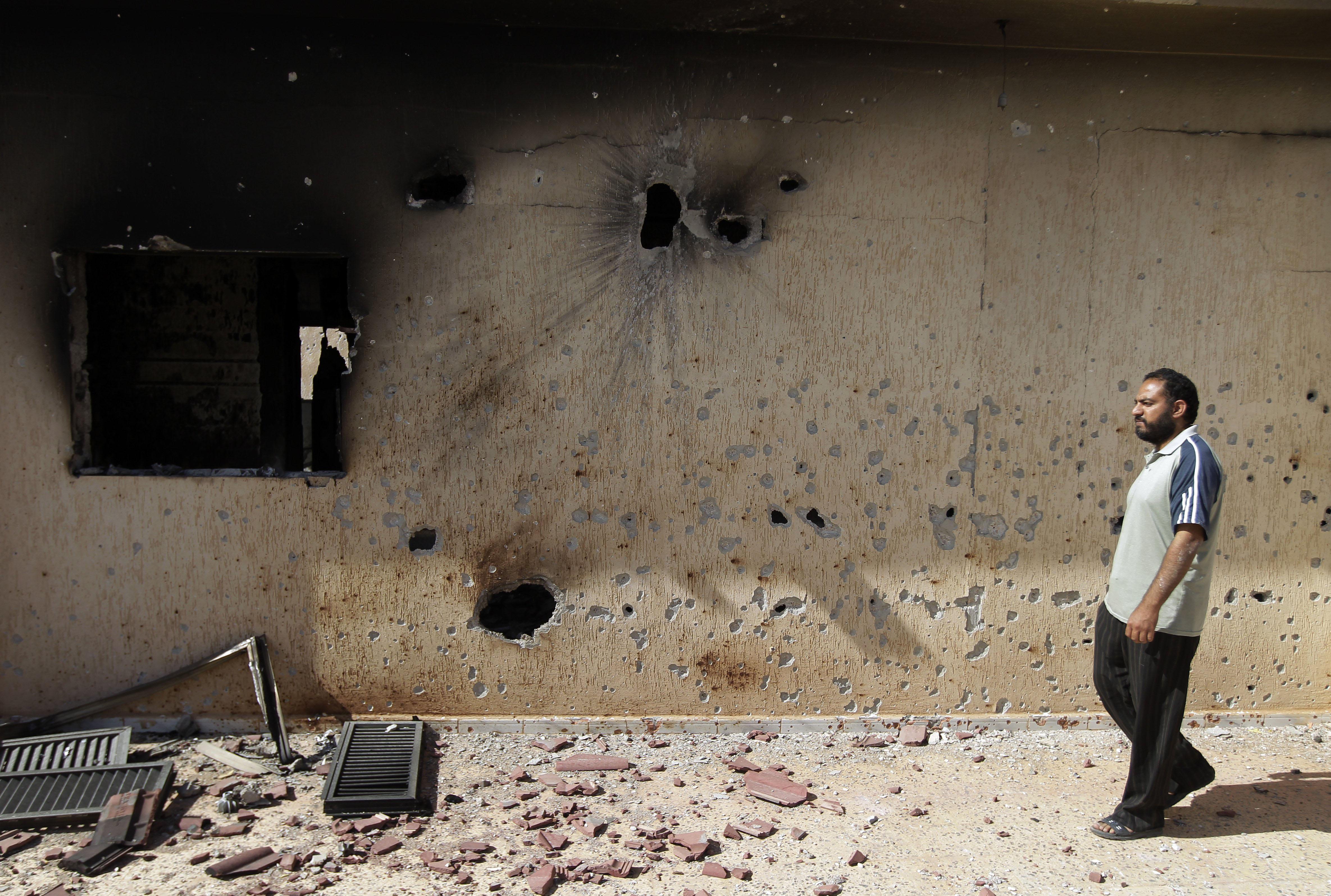SIRTE, Libya— “God and Muammar and Libya, only!” It is the now-taboo motto of the Brother Leader’s Libya, and I heard it more than once here, walking the ruined streets of Muammar Qaddafi’s hometown. Among the shattered houses of the neighborhood where Qaddafi is believed to have spent his final days, I encountered a man who knew exactly who to blame for the destruction. “NATO did this,” he said.
Bullet holes pockmark buildings, windows are shattered, and there are chunks of buildings missing, blasted away by incoming mortar and rocket fire. But nothing looks like it’s been targeted by airstrikes. As far as I can see in District 2, there are no signs that anything was dropped from above: Roofs are intact, no houses are completely leveled. But the man was adamant. “NATO,” he said. Whether it’s merely a coping mechanism that allows him not to blame fellow citizens, or he truly thinks it was Western intervention, it’s hard to tell. Either way, he smiled and recited the six-word slogan of Qaddafi’s Libya. His tone was not unfriendly, if slightly aggressive.
Among the war’s losers, the resentment of defeat is everywhere, as is the pervasive fear that the worst has yet to come. The city’s resentment remains a festering wound in Libya’s already messy future. If there’s going to be a counterrevolution, here live the insurgency’s shock troops.
“We have no water, no electricity, food or medical care,” Hassan Abdel Razzaq told me, standing outside a burnt-out house he says was torched by former rebel fighters because the owner was suspected of working with Qaddafi. “We can’t sleep at night. Rebels shoot all night—they destroy furniture, they destroy houses. I can’t tell the difference between a revolutionary and a thief. We’ve returned to the 19th century.”
Qaddafi always favored Sirte. He turned a small rural settlement on the shore of the Mediterranean Sea into a second de-facto capital, with villas for his cronies and a conference center where he hosted visiting foreign dignitaries. Throughout the war, the residents appeared to cheer Qaddafi and rebuffed attempts to negotiate their surrender.
Over and over again, people took me into their houses to list their complaints. Many of their homes are trashed, possibly looted, and uninhabitable. Said Ibrahim Ali, a 20-year-old medical student sweeping the debris in his family home into a neat pile on the street: “I don’t know what’s going to happen. But I haven’t seen any improvement since the revolutionaries came.”
Some of the city’s residents are taking it upon themselves to fix the wreckage, but they face almost insurmountable obstacles. Mohammed Ehgniwa, a petroleum engineer, is absorbed with restarting Sirte’s water purification plant. But so far it’s not going well. “The city needs cleaning now,” Ehgniwa said. “We need more vehicles and equipment to help us.” Yet no one is sure how to purify the water supply, fearing that there might be corpses rotting in the wells. In any case, the point is moot: There is no electricity to run the purification system.
It never made sense to me why people would support a mercurial dictator like Qaddafi, especially once it was clear he was losing. The rebels used to say Qaddafi was buying his supporters, but the poverty in and around Sirte suggests otherwise. Even with the Brother Leader gone, Qaddafi’s cult of personality appears to be alive and well in his hometown.
“We need security, we need to work safely, no one should disturb or terrorize us,” Ehgniwa told me. “We need a Libyan army to control the people and protect the country as Qaddafi did before. That way nobody can ignore us or bomb inside our country.” Many here seem to see Qaddafi as a man who stood up to the West and made the international community respect Libya.
Qaddafi was born in Qasr Abu Hadi, a rural farming area located just outside Sirte. It is the poorest place I’ve seen in Libya, just a collection of cement houses in the desert scrub. Members of his tribe dug graves for Qaddafi and his son—shallow trenches in the sand surrounded by cinder blocks next to one of Qaddafi’s many tents, since ransacked. They offered to bury the two men here, but the National Transitional Council denied their request. Qaddafi was buried in a secret grave.
When I visited Qasr Abu Hadi, members of Qaddafi’s clan were trying to repair severed underground electricity cables. “We just want things to be the way they were before,” said Ezzedine Abdul Salem, a 31-year-old bus driver covered in sand and dirt from hours of digging. “Before security was better, we had services, schools, university, and electricity.” The winter is approaching and Salem is worried about shelter and water. “Look at us,” he said. “Are we rich? People around the president from different tribes were getting rich. But us, we’re not rich.”
Ehgniwa took me and some other journalists to see the war’s refugees, families from Sirte who fled the fighting and are now homeless and living on the outskirts of the city. The few families squatting in half-completed houses wouldn’t let us inside because we were not family members. “Look at the conditions,” Ehgniwa said, pointing at the cement façade and the lack of windows.
These people have nowhere to go, Ehgniwa said. Their previous houses have been destroyed, and they don’t have money to rebuild. Yet, even here, after losing a war that has left them homeless, the houses are covered with loyalist graffiti. As we approached, I saw a man quickly drop a black rock and walk away from the building. When I walked over to the wall, I saw a familiar phrase written in charcoal: “God and Muammar and Libya, only.”
